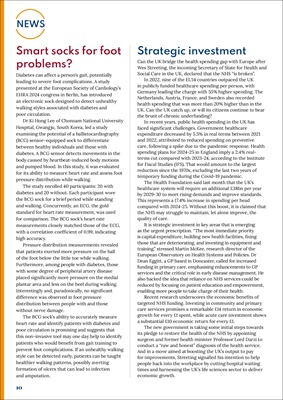
10
NEWS
Smart socks for foot
problems?
Diabetes can affect a person's gait, potentially
leading to severe foot complications. A study
presented at the European Society of Cardiology's
EHRA 2024 congress in Berlin, has introduced
an electronic sock designed to detect unhealthy
walking styles associated with diabetes and
poor circulation.
Dr Ki Hong Lee of Chonnam National University
Hospital, Gwangju, South Korea, led a study
examining the potential of a ballistocardiography
(BCG) sensor-equipped sock to differentiate
between healthy individuals and those with
diabetes. A BCG sensor detects movements in the
body caused by heartbeat-induced body motions
and pumped blood. In this study, it was evaluated
for its ability to measure heart rate and assess foot
pressure distribution while walking.
The study enrolled 40 participants: 20 with
diabetes and 20 without. Each participant wore
the BCG sock for a brief period while standing
and walking. Concurrently, an ECG, the gold
standard for heart rate measurement, was used
for comparison. The BCG sock's heart rate
measurements closely matched those of the ECG,
with a correlation coefficient of 0.99, indicating
high accuracy.
Pressure distribution measurements revealed
that patients exerted more pressure on the ball
of the foot below the little toe while walking.
Furthermore, among people with diabetes, those
with some degree of peripheral artery disease
placed significantly more pressure on the medial
plantar area and less on the heel during walking.
Interestingly and, paradoxically, no significant
difference was observed in foot pressure
distribution between people with and those
without nerve damage.
The BCG sock's ability to accurately measure
heart rate and identify patients with diabetes and
poor circulation is promising and suggests that
this non-invasive tool may one day help to identify
patients who would benefit from gait training to
prevent foot complications. If an unhealthy walking
style can be detected early, patients can be taught
healthier walking patterns, possibly averting
formation of ulcers that can lead to infection
and amputation.
Strategic investment
Can the UK bridge the health spending gap with Europe after
Wes Streeting, the incoming Secretary of State for Health and
Social Care in the UK, declared that the NHS "is broken".
In 2022, nine of the EU14 countries outpaced the UK
in publicly funded healthcare spending per person, with
Germany leading the charge with 55% higher spending. The
Netherlands, Austria, France, and Sweden also recorded
health spending that was more than 20% higher than in the
UK. Can the UK catch up, or will its citizens continue to bear
the brunt of chronic underfunding?
In recent years, public health spending in the UK has
faced significant challenges. Government healthcare
expenditure decreased by 5.5% in real terms between 2021
and 2022, attributed to reduced spending on preventive
care, following a spike due to the pandemic response. Health
spending plans for 2024-25 in England imply a 2.4% realterms cut compared
with 2023-24, according to the Institute
for Fiscal Studies (IFS). That would amount to the largest
reduction since the 1970s, excluding the last two years of
temporary funding during the Covid-19 pandemic.
The Health Foundation said last month that the UK's
healthcare system will require an additional £38bn per year
by 2029-30 to meet rising demands and improve standards.
This represents a 17.4% increase in spending per head
compared with 2024-25. Without this boost, it is claimed that
the NHS may struggle to maintain, let alone improve, the
quality of care.
It is strategic investment in key areas that is emerging
as the urgent prescription. "The most immediate priority
is capital expenditure, building new health facilities, fixing
those that are deteriorating, and investing in equipment and
training," stressed Martin McKee, research director of the
European Observatory on Health Systems and Policies. Dr
Dean Eggitt, a GP based in Doncaster, called for increased
funding in primary care, emphasising enhancements to GP
services and the critical role in early disease management. He
also backed the idea that reliance on NHS services could be
reduced by focusing on patient education and empowerment,
enabling more people to take charge of their health.
Recent research underscores the economic benefits of
targeted NHS funding. Investing in community and primary
care services promises a remarkable £14 return in economic
growth for every £1 spent, while acute care investment shows
a substantial £10 economic return for every £1.
The new government is taking some initial steps towards
its pledge to restore the health of the NHS by appointing
surgeon and former health minister Professor Lord Darzi to
conduct a "raw and honest" diagnosis of the health service.
And in a move aimed at boosting the UK's output to pay
for improvements, Streeting signalled his intention to help
people back into the workplace by cutting hospital waiting
times and harnessing the UK's life sciences sector to deliver
economic growth.